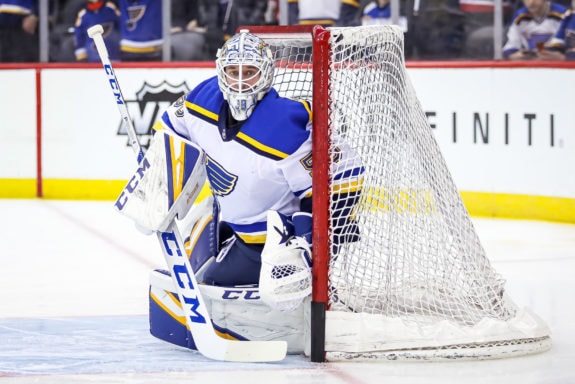The St. Louis Blues 2021-22 season represented a major transition for the franchise. No longer a stout defensive team built from the blueline out, they finished second in the NHL in goals scored, with nine forwards recording 20-plus goals. Though the season came to an end in a six-game defeat by the Colorado Avalanche in the second round, there are plenty of highs and lows to reflect on. In this series, we’ll evaluate each player who played 10 or more games with the team (as well as the head coach and general manager), grading their individual performance and looking at their future with the team.
There’s no denying it: the 2021-22 season was not ideal for Jordan Binnington. He looked unreliable often, looked downright awful at times, and ultimately lost his starting job to Ville Husso. To make matters even worse, at least for Blues management, this collapse came in the first year of Binnington’s newly signed six-year, $36 million contract, clouding the team’s future in net, at least in the short run.
Related: Blues’ Goaltending Future is Bright
With that said, it looked like Binnington had righted the ship in the playoffs. Actually, he was the biggest reason the Blues went as deep as they did, until a collision with Nazem Kadri and teammate Calle Rosen in his own crease. He would be unable to return to the series, putting an awkward ellipsis at the end of a rocky season. Now, it’s our job to determine how heavily his short run of playoff brilliance should be weighted in the final grading of his season and to look at what’s next for the controversial netminder.
What Went Right: The Playoffs (Until His Injury)
Leaving aside the controversy surrounding his collision with and subsequent tantrum aimed at Kadri, a bad look that put a sour and uncertain note at the end of his season, Binnington had a simply fantastic postseason. He did not enter as the starter, having lost that job to Husso, who then posted a shutout in Game 1. But Husso looked shaky in Games 2 and 3, so head coach Craig Berube turned to the starter that had carried the Blues to Stanley Cup glory before. And Binnington shouldered the responsibility and ran with it.

Binnington played in just six postseason games, including the one he left early, but he was fantastic. He went 4-1-0, posting a .949 save percentage (SV%) and a 1.72 goals-against average (GAA), which still leads all playoff goaltenders. He also made 7.4 goals saved above average (GSAA), an impressive feat in just over five games. Binnington turned the tide for the Blues against the Minnesota Wild, did his best to steal Game 1 against the Colorado Avalanche, and looked to be the potential x-factor that might get the Blues past one of the best teams in the league. Unfortunately, it all came to an abrupt end and we can’t know how far he could have carried the team. But it certainly redeemed much of the disappointment of the regular season.
What Went Wrong: The Regular Season
The good was very good for Binnington in the postseason, but the bad of the regular season was extremely bad at times. The low point came in a three-game stretch in January and February, when he allowed six, seven, and five goals in consecutive games against the Toronto Maple Leafs, the Calgary Flames, and the New Jersey Devils. That was the final nail in the coffin, and he only played intermittently after that.
Key Facts
- Tied (with Jacob Markstrom) for the seventh-highest average annual value (AAV) contract among goalies
- Third in playoff GSAA (at this writing) with 7.4
- Ranked as the top playoff goaltender in puckhandling efficiency
Final Grade: D
Binnington’s playoff recovery was remarkable and gives fans hope for next season. But it wasn’t enough to erase the total disappointment of the regular season. Had he not excelled in the postseason, his grade would have clearly been an “F.” Now, he needs to prove that the goaltender fans saw in the playoffs is the goalie he can be going forward.
What’s Next for Binnington?
The Blues have Binnington locked up for five more seasons. Husso is probably departing in free agency this summer as one of the few potential starters in a starved free agent goalie market. Whether the Blues convince themselves Charlie Lindgren can be their backup goaltender, or they sign a veteran backup on the cheap, Binnington will reclaim his place as the team’s starter, assuming he’s healthy to start the season. It’s now his job to prove that the regular season was an anomaly because it certainly wasn’t good enough.